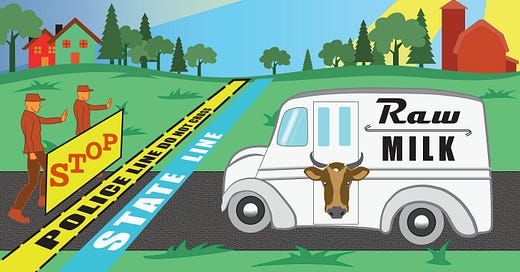The Unique Story of The Raw Milk Freedom Rider Mamas
Most Americans are appalled when they hear that their tax dollars are hard at work criminalizing mamas for taking healthy milk across state lines. Yet here we are.
Spoiler alert: the solution is localizing our food production on the community level. Yes, this includes our dairies. However, this momentum ceases when individuals' greed and ego take over. These undermine any solid footholds for long term success. It will not work to use a movement of good people to unknowingly finance the protection of a few farmers with far-reaching, shady, and profit-driven motives. This is about building communities in very questionable times. This is a time for transparency from all sides.
For me, this journey started when I had my first child. I was determined to feed my family the best I could. Health challenges in my oldest cemented that determination. My research and questions led me to raw dairy.
Milk: an age old food used to nourish humans for millennia. Yet, it was almost impossible to find for my family. It required, at minimum, a 1.5 hour drive each way and a large, up front expense. I had to purchase ownership in a cow.
This was a huge commitment for a young family. But I made it unwaveringly.
It lasted about a year until a strategic change in the state law rendered “cow shares” illegal and turned the farmer into a criminal overnight. He was a dairy farmer, not an outlaw. We no longer had our source of milk for my small and growing family.
Now, I was compelled to drive even further – and across state lines – in order to get this food that clearly helped my children’s health.
It was the “across state lines” that mattered the most.
This mere act criminalized me for feeding my family. Sure, the chance of enforcement was slim. But the law was written, which made it selectively enforceable.
To the dismay of many fellow Americans, the FDA chose to dramatically enforce this law against farmers who were providing clean, permitted food. Many states have laws in place that allow for the production and sale of unprocessed – or raw – milk.
My neighboring state of Pennsylvania is among them. I watched as law enforcement used this tiny federal regulation to impose awful force against many farms.
As my family grew, 3, 4, then 5 children, I observed.
Here I was, surrounded by fast food, liquor stores, “convenience stores” and all their accompanying processed foods, yet I had to drive 2 hours one-way for clean, unprocessed milk AND had to take the risk of defying a federal regulation to bring this food home for my family.
It was unacceptable.
Peaceful access to safe food is a human right. The right to engage with a producer I knew and trusted, and for me to nourish my family the best I could is a fundamental right.
This had threads of injustice. If it was this difficult for me to access these foods, how much harder was it for other community members? Would our guests of America even know where to look?
I turned to history for answers.
And history had them.
In 1961 a group of courageous, compassionate, civil rights activists called the Freedom Riders got on buses and traveled into the deep South, “Deliberately violating Jim Crow laws in order to test and challenge a segregated interstate travel system.”
I wondered, could we apply the same idea to inspire a change in milk laws and thus bring this food possibility to more Americans?
So on November 1, 2011, I led a group of mamas in our minivans. The Raw Milk Freedom Riders drove into PA, bought raw milk, and caravanned our way back into Maryland right to the lawn of the FDA building in Silver Spring.
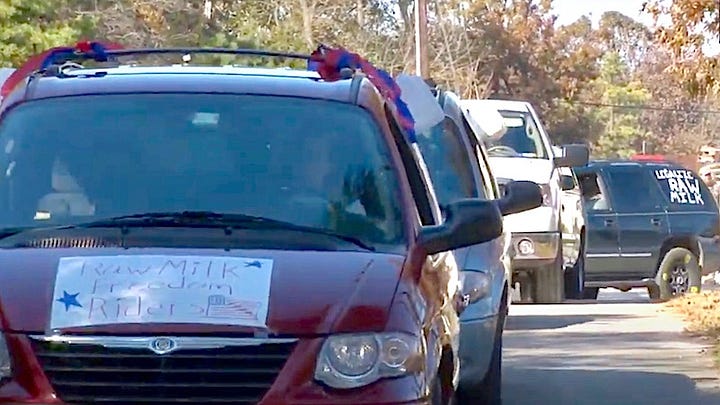
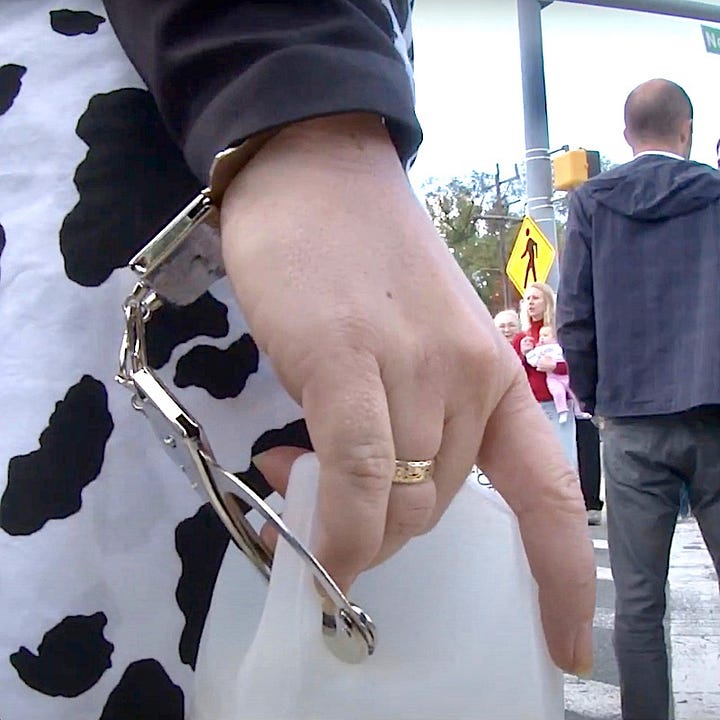
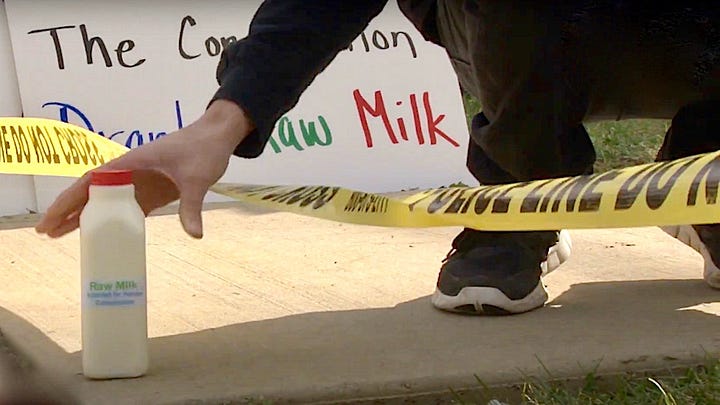
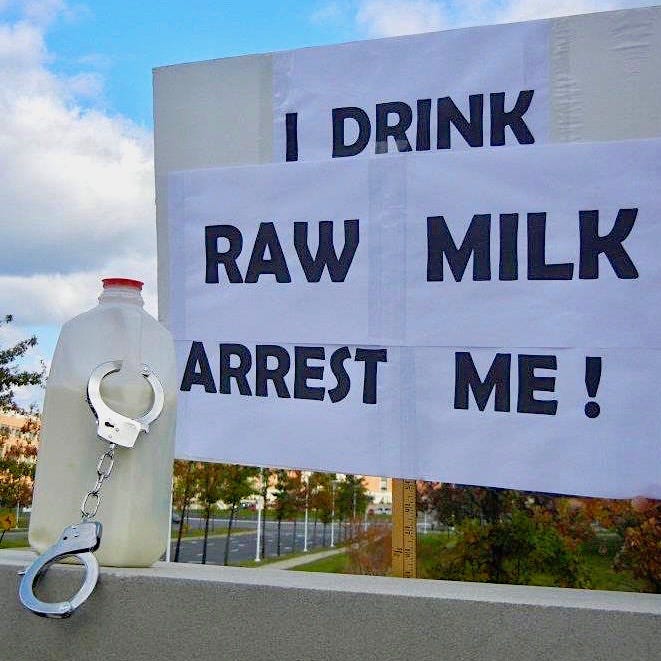
Before we began this journey, the milk mamas alerted the FDA as to exactly what we were doing and invited them to meet us on the state line and arrest us. We were ready for any outcome. We did not know what outcome we would get.
At the state line, we got out of our minivans and waited. No law enforcement. We were not surprised.
We drove to the FDA headquarters in Silver Spring–another 1+ hour drive. There we gathered, happy to share our milk and cookies with the FDA and the law enforcement who were present.
It was that same day that the FDA issued a statement. “With respect to the interstate sale and distribution of raw milk, the FDA has never taken, nor does it intend to take, enforcement action against an individual who purchased and transported raw milk across state lines solely for his or her own personal consumption.” Source
To my knowledge, this was the first and only time they have conceded any ground in their draconian and dogmatic approach to enforcing the ban on interstate transport of raw dairy. And it was huge.
We were grateful for that ever so slightly bending statement. Mamas everywhere could engage.
However, there is more to accomplish.
The draconian actions by the FDA may have contributed in the creation of an unforeseen thriving black market where certain farmers are rewarded for greed and ego over customer safety. These farmers hide behind a cloak of humility and simpleness, a persona of a modern Robin Hood. Good honest people are “buying into” shady, and sometimes downright nefarious scams that profit off of fear, price gouging, and promises of legal protection.
Is there a solution?
Yes, there are two main solutions. They are both simple. Not easy.
1. Repeal the ban on interstate transportation of raw milk intended for human consumption.
This involves political will. It means that enough mamas have to get mad enough that we work to make this change meaningful on the political level.
It means that enough taxpayers get rightfully outraged that their tax dollars are used to enforce against peaceful farmers who are following all their state laws.
Their “crime:” simply serving a community across a state line within reasonable distance. Here on the east coast, our cities are right up against each other. We are close to each other. Few of us have access to enough land to do any type of farming, much less dairying. It doesn’t make sense for a federal agency to attack small farmers who are going from their rural area to the closest city if that city happens to be 20-50 miles across an imaginary, yet legally enforceable state line.
Let’s look at the situation: almost all our states have legal sales of raw milk within the state. Farmers are inspected, tested and have to adhere to certain safety standards. Whether that milk travels 50 miles or 100 miles, it is the same milk. If it can travel 1000 miles from one corner of CA to the other, it only makes sense for people in cities on the east coast to have access to clean, safe, fresh milk from our closest farms even if that farm is across a line.
2. Create hyper local small dairies within every community.
This solution is much more sustainable and highly preferable. For true food security and for the safest, cleanest food possible, every community needs to have the space and the freedom to have their own dairy. This way, every community (municipality, neighborhood, town, etc.) would set up the rules and parameters that make the most sense to them. There would not be one, overarching rule governing the deserts of Nevada with the same standards as the marshlands of Maryland.
Food quality and production standards would have to meet (and hopefully exceed) state requirements.
Indeed, this is how dairying was (and is in many places worldwide) for the majority of human history. There was no long distance transportation. So the communities that had dairy, had only local dairy. An evolved return to this tradition would ensure many vital needs for our communities:
Safe, clean food.
Secure food systems.
Less travel for food procurement.
Building regenerative ecosystems.
Less costs to taxpayers at a federal level
Less need for federal agency draconian enforcement
Food Mamas Unite!
If you are pondering on whether or not your life is too hectic to be a contributing force, know this: you can help right now in any one, or more, of the following ways:
Share the link to this story. Share what milk mamas struggle with throughout our great nation.
Contributing time in any capacity that fits your schedule is invaluable.
Use your circle of influence to elevate awareness to our cause.
Ask questions. ASK me! I am here for you.
Together, we can build paths towards food security.


